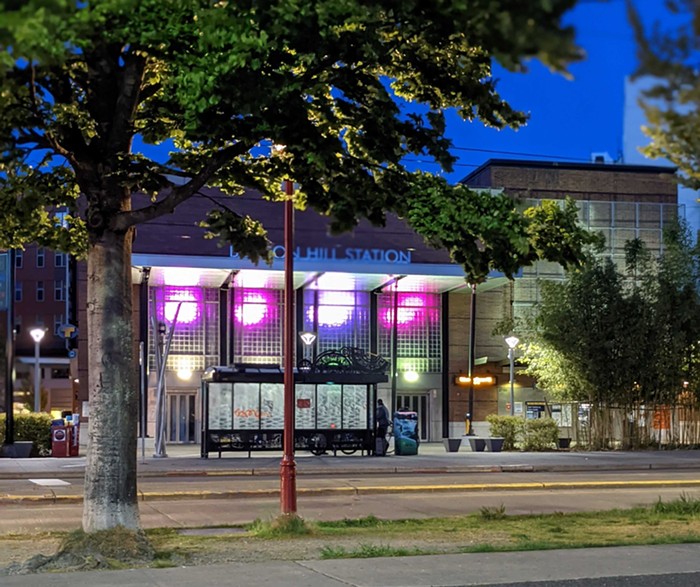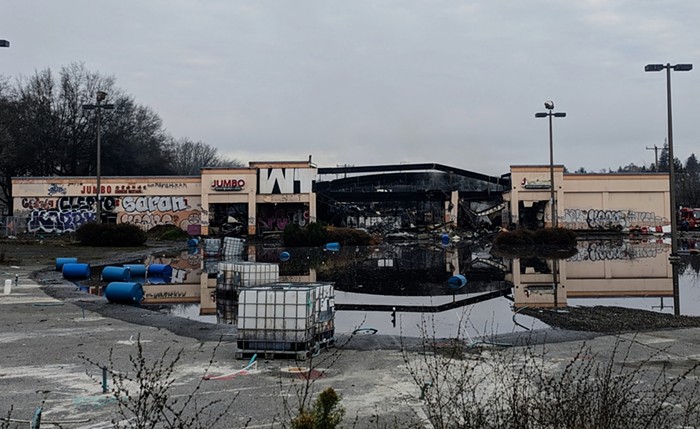
What American cities can learn from Seattle is an A-list corporate community, a brimming billionaire club, and a GDP ($350 billion) that's almost the same as Nigeria's ($375 billion), a country with a population that's 40 times that of the Seattle metropolitan area. All of these riches and much, much more will not make your city happy. Instead, as the wealth grows, the sad passions (more about that in a minute) grow with it. One only has to scan the city's recent news stories and coming events to find confirmation of Seattle's down and low mood.
For example, there's the event in June called "What's the END GAME?," which will have a panel of millionaires and radio show hosts 'splainin' "real ways" to solve the city's homeless crisis, which, for them, cannot be dissociated from the evils of drug addiction. Expect no joy at this event. It will be about how tough choices must be made, how the raw rule of law must be enforced, and police power be doubled or trebled to bring the clueless city to its senses. END GAME will be a real bummer.
Then there's Seattle Times' editorial, "Let new council decide Seattle neighborhoods' fate," which pulls a page directly from the GOP playbook that blocked Obama from nominating a judge for an open and important Supreme Court seat: The current city council should not vote on "consequential land-use decisions" because, supposedly, it is a "lame-duck council." We must wait for voters to speak first and then decide on major issues.
Then there's Amazon. This corporation, which has a market value of $1 trillion, is not all happy; despite receiving a massive subsidy in the form of zero income taxes from the state, it wants even more from a city it sees only as recalcitrant and ungrateful. And so, as reported by Lester Black and Nathalie Graham, it's pouring hundreds of thousands of dollars into the coming city council race. But do not believe for a minute that Amazon will finally be cheerful about Seattle if the composition of the council is converted by voters to favor its stated interests. Money does not buy happiness; instead, it buys more ways to be unhappy about why more money is not being made.
Seattle's lame duck council should not pass legislation permanently harming single-family neighborhoods occupied by half of its residents. Any major changes should be done by the new, accountable council that will be elected in November. https://t.co/TG0TZLkGDO pic.twitter.com/pjdFd0ojhj
— SeattleTimes Opinion (@SeaTimesOpinion) May 22, 2019
Right wing radio hosts, anti-homeless hate group leaders, pro-corporate advocates & Republican dark money recipients—basically a targeted harassment supergroup—are having a forum on homelessness asking “What’s the END GAME?”
Nothing ominous about that#SafeSeattleIsAHateGroup pic.twitter.com/L5JtW5zUY7
— Brett Hamil (@BrettHamil) May 16, 2019
The consequence of this constant sludge of terribly sad news stories and events is a thick miasma of what the 17th-century Dutch philosopher Baruch Spinoza called the "painful passions." What this means is we have a city that can't celebrate anything, that, day after day, is gripped by a sense of its diminishing powers. Everything in Seattle can only be totally wrong, always getting worse, even dying. There is no time or room for joy because the mayor or the council is not doing enough to make the life of the poorest members of one of the richest cities in the world as miserable as possible. Make no mistake, this is their END GAME.
Canadian philosopher Beth Lord's little book Spinoza's Ethics provides this succinct description of Spinozian psychology:
The mind’s transition to greater perfection and flourishing is the passion of joy, and its transition to lesser perfection and flourishing is the passion of sadness (P11S). The parallel feelings of the body are pleasure and pain: pleasure increases our body’s ability to act, whereas pain decreases it. Our feelings are the barometer of the well-being that we desire to enhance. Joy-pleasure increases the flourishing of our being, making the mind and body more active, and sadness-pain diminishes our flourishing and our activity. Desire, joy, and sadness are the three ‘primary affects’ that are the basis of all our other feelings.
But what is key to this psychology is its social dimension. For Spinoza, an individual cannot flourish without others flourishing. It is in his or her self-interest that they combine with others to increase their perfection, which is the state of being active (happy) rather than passive (sad). This is what Spinoza means by "a human is a god to a human."
Seattle might have lots of money, but it's not at all flourishing. It's dumping a huge amount of humans onto its streets, and those with the means to make these and other humans thrive, and therefore themselves thrive (Spinoza calls this the highest form of reason), are instead bent on removing the little and remaining power the homeless have left. But the city must see what true joy is. It's not offering charity or pity, which for Spinoza are also the products of the sad passions, but "joining forces" with the homeless.
The people living in tents or RVs are not trash; they are human beings, and what we, as a city, are doing, anthropologically (meaning, the human as an animal), is denying them the natural right to participate in their species (the kind of animal the human is), which is profoundly social. Instead, we are forcing them to be the most painful kind of human possible, an isolated human, a human who cannot flourish by flourishing with others. The urban program of millionaires and local radio celebrities participating in the END GAME, or the members of Seattle Times' editorial board, are essentially sad because they want to deprive the poorest humans in the city of their very humanness, which can only be fully expressed by joining forces with other humans. In this depressing state of affairs, no matter how much money grows in this city, it is doomed to remain unhappy.


















